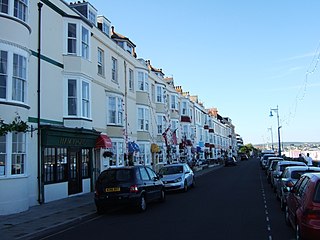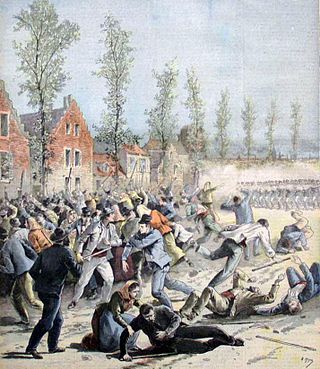IP or Ip or ip may refer to:

Mohandas Karamchand Gandhi was an Indian lawyer, anti-colonial nationalist and political ethicist who employed nonviolent resistance to lead the successful campaign for India's independence from British rule. He inspired movements for civil rights and freedom across the world. The honorific Mahātmā, first applied to him in 1914 in South Africa, is now used throughout the world.

Property is a system of rights that gives people legal control of valuable things, and also refers to the valuable things themselves. Depending on the nature of the property, an owner of property may have the right to consume, alter, share, redefine, rent, mortgage, pawn, sell, exchange, transfer, give away, or destroy it, or to exclude others from doing these things, as well as to perhaps abandon it; whereas regardless of the nature of the property, the owner thereof has the right to properly use it under the granted property rights.
Right-wing politics describes the range of political ideologies that view certain social orders and hierarchies as inevitable, natural, normal, or desirable, typically supporting this position based on natural law, economics, authority, property or tradition. Hierarchy and inequality may be seen as natural results of traditional social differences or competition in market economies.
Eminent domain, land acquisition, compulsory purchase, resumption, resumption/compulsory acquisition, or expropriation is the power of a state, provincial, or national government to take private property for public use. It does not include the power to take and transfer ownership of private property from one property owner to another private property owner without a valid public purpose. This power can be legislatively delegated by the state to municipalities, government subdivisions, or even to private persons or corporations, when they are authorized by the legislature to exercise the functions of public character.
Liberalization or liberalisation is a broad term that refers to the practice of making laws, systems, or opinions less severe, usually in the sense of eliminating certain government regulations or restrictions. The term is used most often in relation to economics, where it refers to economic liberalization, the removal or reduction of restrictions placed upon economic activity. However, liberalization can also be used as a synonym for decriminalization or legalization, for example when describing drug liberalization.
A dissident is a person who actively challenges an established political or religious system, doctrine, belief, policy, or institution. In a religious context, the word has been used since the 18th century, and in the political sense since the 20th century, coinciding with the rise of authoritarian governments in countries such as Fascist Italy, Nazi Germany, Imperial Japan, Francoist Spain, the Soviet Union, Saudi Arabia, North Korea, Turkey, Iran, China, and Turkmenistan. In the Western world, there are historical examples of people who have been considered and have considered themselves dissidents, such as the Dutch philosopher Baruch Spinoza. In totalitarian countries, dissidents are often incarcerated or executed without explicit political accusations, or due to infringements of the very same laws they are opposing, or because they are supporting civil liberties such as freedom of speech.
An estate in land is, in the law of England and Wales, an interest in real property that is or may become possessory. It is a type of personal property and encompasses land ownership, rental and other arrangements that give people the right to use land. This is distinct from sovereignty over the land, which includes the right to government and taxation.

Juan José Arévalo Bermejo was a Guatemalan professor of philosophy who became Guatemala's first democratically elected president in 1945. He was elected following a popular uprising against the United States-backed dictator Jorge Ubico that began the Guatemalan Revolution. He remained in office until 1951, surviving 25 coup attempts. He did not contest the election of 1951, instead choosing to hand over power to Jacobo Árbenz. As president, he enacted several social reform policies, including an increase in the minimum wage and a series of literacy programs. He also oversaw the drafting of a new constitution in 1945.
A creditor or lender is a party that has a claim on the services of a second party. It is a person or institution to whom money is owed. The first party, in general, has provided some property or service to the second party under the assumption that the second party will return an equivalent property and service. The second party is frequently called a debtor or borrower. The first party is called the creditor, which is the lender of property, service, or money.
Freedom of movement, mobility rights, or the right to travel is a human rights concept encompassing the right of individuals to travel from place to place within the territory of a country, and to leave the country and return to it. The right includes not only visiting places, but changing the place where the individual resides or works.

Dalit, also previously known as untouchable, is the lowest stratum of the castes in India. Dalits were excluded from the four-fold varna system of Hinduism and were seen as forming a fifth varna, also known by the name of Panchama. Dalits now profess various religious beliefs, including Hinduism, Buddhism, Sikhism, Christianity, and Islam. Scheduled Castes is the official term for Dalits as per the Constitution of India.
The Access to Knowledge (A2K) movement is a loose collection of civil society groups, governments, and individuals converging on the idea that access to knowledge should be linked to fundamental principles of justice, freedom, and economic development.

The Fundamental Rights, Directive Principles of State Policy and Fundamental Duties' are sections of the Constitution of India that prescribe the fundamental obligations of the states to its citizens and the duties and the rights of the citizens to the State. These sections are considered vital elements of the constitution, which was developed between 1949 by the Constituent Assembly of India.
The Fundamental Rights in India enshrined in part III of the Constitution of India guarantee civil liberties such that all Indians can lead their lives in peace and harmony as citizens of India. These rights are known as "fundamental" as they are the most essential for all-round development i.e., material, intellectual, moral and spiritual and protected by fundamental law of the land i.e. constitution. If the rights provided by Constitution especially the Fundamental rights are violated the Supreme Court and the High Courts can issue writs under Articles 32 and 226 of the Constitution, respectively, directing the State Machinery for enforcement of the fundamental rights.

The Naxalite–Maoist insurgency is an ongoing conflict between Maoist groups known as Naxalites or Naxals and the Indian government. The influence zone of the Naxalites is called the red corridor, which has been steadily declining in terms of geographical coverage and number of violent incidents, and in 2021 it was confined to the 25 "most affected" locations and 70 "total affected" districts across 10 states in two coal-rich, remote, forested hilly clusters in and around the Dandakaranya-Chhattisgarh-Odisha region and the tri-junction area of Jharkhand-Bihar and-West Bengal. The Naxalites have frequently targeted tribal, police and government workers in what they say is a fight for improved land rights and more jobs for neglected agricultural labourers and the poor.

Direct action originated as a political activist term for economic and political acts in which the actors use their power—such as economic or physical power—to directly achieve their goals. In contrast, actions that appeal to others might achieve their goals by, for example, highlighting an existing problem to the public or demonstrating a possible solution to authorities.
The Ingress into India Ordinance, 1914, a law passed in British India in September 1914, at the outset of World War I, allowed the Government of India to screen, detain, and restrict the movement of people returning to India.

The Kheda Satyagraha of 1918 was a satyagraha movement in the Kheda district of Gujarat in India organised by Mahatma Gandhi during the period of the British Raj. It was a major revolt in the Indian independence movement. It was the third Satyagraha movement, which was launched 7 days after the Ahmedabad mill strike. After the successful Satyagraha conducted at Champaran in Bihar, Gandhi organised the movement to support peasants who were unable to pay the revenue because of famine and plague epidemic.
The Women's suffrage movement in India fought for Indian women's right to political enfranchisement in Colonial India under British rule. Beyond suffrage, the movement was fighting for women's right to stand for and hold office during the colonial era. In 1918, when Britain granted limited suffrage to women property holders, the law did not apply to British citizens in other parts of the Empire. Despite petitions presented by women and men to the British commissions sent to evaluate Indian voting regulations, women's demands were ignored in the Montagu–Chelmsford Reforms. In 1919, impassioned pleas and reports indicating support for women to have the vote were presented by suffragists to the India Office and before the Joint Select Committee of the House of Lords and Commons, who were meeting to finalize the electoral regulation reforms of the Southborough Franchise Committee. Though they were not granted voting rights, nor the right to stand in elections, the Government of India Act 1919 allowed Provincial Councils to determine if women could vote, provided they met stringent property, income, or educational levels.







